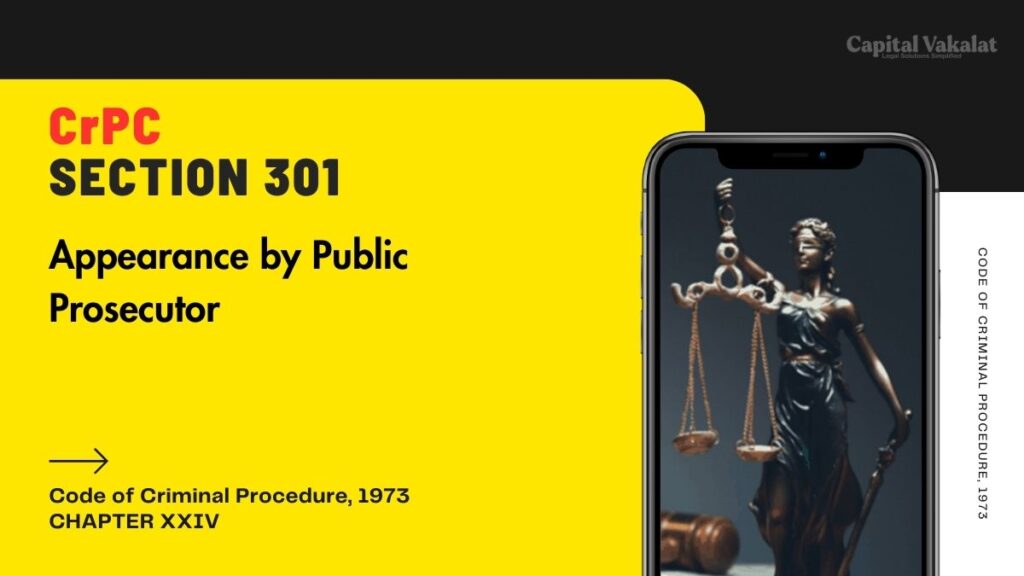Section 301 of the Code of Criminal Procedure (CrPC) in India addresses the appearance of public prosecutors in court. This section lays out the framework and guidelines for how public prosecutors can participate in legal proceedings, underscoring their crucial role in the criminal justice system.

This article delves into the intricacies of Section 301 CrPC, exploring its implications, the responsibilities it bestows on public prosecutors, and its impact on the judicial process.
Bare Act. Section 301 Cr.P.C.
Appearance by Public Prosecutors.
(1) The Public Prosecutor or Assistant Public Prosecutor in charge of a case may appear and plead without any written authority before any Court in which that case is under inquiry, trial or appeal.
(2) If in any such case any private person instructs a pleader to prosecute any person in any Court, the Public Prosecutor or Assistant Public Prosecutor in charge of the case shall conduct the prosecution, and the pleader so instructed shall act therein under the directions of the Public Prosecutor or Assistant Public Prosecutor, and may, with the permission of the Court, submit written arguments after the evidence is closed in the case.
STATE AMENDMENT
West Bengal
For sub-section (1) of section 301 of the principal Act, the following sub-sections shall be substituted:--
"(1) (a) The Public Prosecutor in charge of a case may appear and plead without any written authority before any Court in which that case is under inquiry, trial or appeal.
(b) The Assistant Public Prosecutor in charge of a case may appear and plead without any written authority before any Court in which that case is under inquiry or trial.".
[Vide West Bengal Act 26 of 1990, s. 4.]
The Role of Public Prosecutors
Public prosecutors are appointed by the government to represent the state in criminal cases. They act as the link between the judiciary and the police, ensuring that justice is served while maintaining the integrity of the legal process. Their primary responsibility is to prosecute accused individuals, presenting evidence and arguments in court to prove the state’s case.
Detailed Overview of Section 301 CrPC
Section 301 CrPC provides specific guidelines on how public prosecutors can intervene in cases. It allows them to appear and plead without having to seek special permission from the court. This section is pivotal in enabling public prosecutors to carry out their duties effectively, ensuring that justice is neither delayed nor denied.
Subsection (1): Appearance by Public Prosecutors
Subsection (1) of Section 301 CrPC states that public prosecutors, or assistant public prosecutors, may appear and plead without any written authority before any court in which that case is under inquiry, trial, or appeal. This provision ensures that public prosecutors can act swiftly and decisively in the course of a trial.
Subsection (2): Assisting the Court
Subsection (2) allows the public prosecutor to give instructions to any lawyer appearing for the prosecution. This means that even if a private lawyer is representing the state, the public prosecutor retains the authority to guide the proceedings. It ensures that the prosecutorial process remains aligned with the state’s objectives and legal standards.
Implications for the Judicial Process
Section 301 CrPC plays a critical role in maintaining the flow of the judicial process. By allowing public prosecutors to appear and plead without hindrance, it streamlines courtroom procedures. This section helps prevent unnecessary delays, ensuring that cases proceed efficiently.
Challenges Faced by Public Prosecutors
Despite the provisions of Section 301 CrPC, public prosecutors often face numerous challenges. Heavy caseloads, limited resources, and bureaucratic hurdles can impede their ability to function optimally. Addressing these issues is essential for the effective implementation of Section 301 and the overall efficiency of the criminal justice system.
Public Prosecutor’s Independence and Accountability
While public prosecutors are government appointees, they must exercise independence and impartiality. Section 301 CrPC ensures they have the authority to act in the state’s interest, but this power comes with the responsibility of upholding justice and the rule of law. Prosecutors must balance their duties with ethical considerations, avoiding any undue influence or pressure.
Comparative Analysis with Other Jurisdictions
Examining how other jurisdictions handle the role of public prosecutors can provide valuable insights. In many countries, similar provisions exist to empower public prosecutors. Understanding these comparative frameworks can help identify best practices and areas for improvement within the Indian legal system.
Case Studies Highlighting Section 301 CrPC
Analyzing landmark cases where Section 301 CrPC was pivotal can illustrate its practical applications. These case studies shed light on how public prosecutors leverage this section to fulfill their duties and the outcomes of such interventions in the judicial process.
Future Perspectives on Section 301 CrPC
As the legal landscape evolves, so too must the frameworks governing public prosecutors. Ongoing legal reforms and judicial interpretations will shape the future application of Section 301 CrPC. Ensuring that this section adapts to contemporary challenges is crucial for maintaining its relevance and efficacy.
Conclusion
Section 301 CrPC is a cornerstone in the functioning of public prosecutors in India. By granting them the authority to appear and plead without unnecessary formalities, it facilitates a smoother judicial process. However, the challenges faced by public prosecutors must be addressed to ensure that they can perform their duties effectively. As we move forward, continuous evaluation and reform of this section will be necessary to uphold the principles of justice and the rule of law.